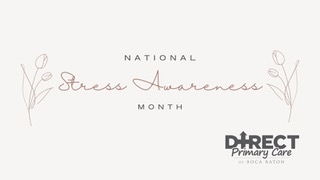Minimize Your Stress Maximize Your Life

April is Stress Awareness Month, and with 55% of Americans stressed during the day and stress causing 57% of US respondents to feel paralyzed, it’s essential to address this issue and share how we at Direct Primary Care of Boca can help you minimize your stress.
Breathing
Studies by the National Library of Medicine concluded that diaphragmatic breathing positively affected the lowering of physiological and psychological stress. Deep breathing for 20 minutes daily increases the oxygen supply to your brain and stimulates the nervous system, eliminating anxiousness and promoting tranquility.
Sleeping
Sleeping allows our brains to recharge, bodies to rest, muscles to repair, and memory to consolidate. Sleep deprivation or poor sleep can affect memory, judgment, and mood. In addition to feelings of listlessness, chronic sleep deprivation contributes to health problems, including obesity and high blood pressure. Research revealed that most Americans would be happier, healthier, and safer if they slept an extra 60 – 90 minutes per night.
Dieting
According to the National Library of Medicine, diet directly correlates with mood. The effect of diet on brain function is one pathway for the development of psychiatric disorders, including depression.
Moving
When stress is climbing, it’s vital that you get your body moving. You don’t have to start P90X; a 10-minute walk can release endorphins, lower stress, and boost your mood.
Focusing
When you’re stressed, you’re focused on your problem. Instead, begin making a mental or physical list of things you have and are grateful for. This could include your job, family, health, friends, a bed, food, and running water. The more you focus on gratitude, the more perspective you will have, and the more you will find things for which you are grateful.
Reassessing
Nowadays, our jam-packed schedules cause us to feel run down, leaving us unable to manage the stress when it comes. It’s imperative to reassess your schedule to make sure you have margin. Remember, you are in control of your schedule.
Hugging
The late psychotherapist Virginia Satir once said, “We need four hugs a day for survival. We need eight hugs a day for maintenance. We need 12 hugs a day for growth.” Receiving a 20-second hug has been proven to reduce cortisol and increase oxytocin, boosting heart health.
Journaling
Getting your thoughts out of your head and on paper is a long-proven technique to help reduce stress. Journaling has been scientifically proven to:
- Reduces the number of sick days
- Decreases experience of pain
- Decreases the symptoms of inflammatory conditions like asthma and rheumatoid arthritis
- Strengthens immune system response
- Improves ability to cope with illness
Make an appointment
If you’re feeling excessive stress and haven’t had a physical in the last year, why not make an appointment? At every appointment, we do a patient health questionnaire and offer an EKG and discounted labs, which are included in your membership.
Don’t let stress get the best of you!
Sources:
National Stress Awareness Month [Internet] National Institutes of Health [March 2024] Available from: https://hr.nih.gov/working-nih/civil/national-stress-awareness-month
Coping with Stress [Internet] Center of Disease Control [April 2023] Available from: https://www.cdc.gov/mentalhealth/cope-with-stress/index.html?
